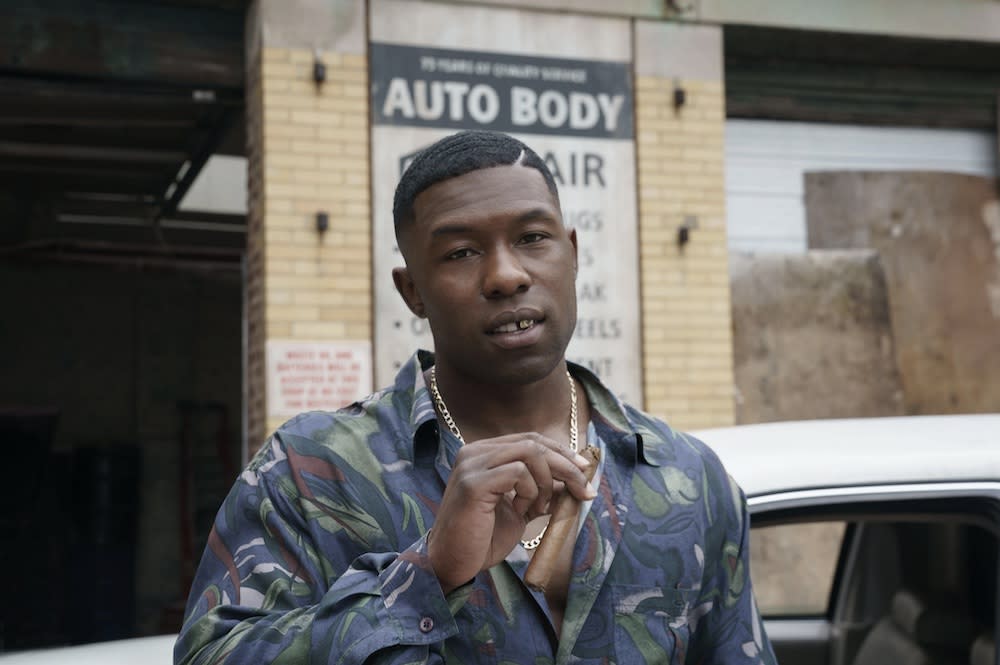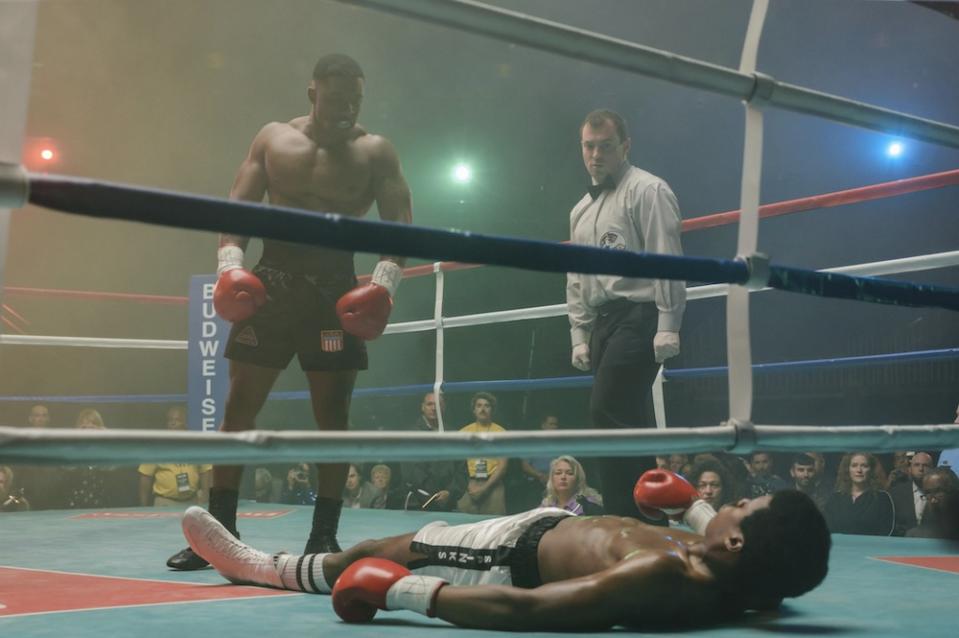‘Mike’ Review: A Featherweight Replica of Mike Tyson’s Real-Life Drama

- Oops!Something went wrong.Please try again later.
In “Mike,” blood, sweat, and probably a few tears splatter off the faces of Mike Tyson’s opponents in the ring. One after another, they’re hit with his explosive left hook, their cheeks ricocheting off their jaws before they topple dramatically to the ground. Hulu’s limited series, helmed by Steven Rogers and Craig Gillespie (the writer and director behind “I, Tonya,” respectively), slows these moments down, intent on displaying the physical impact of Tyson’s superhuman strength on the body. This sheer power, coupled with a steadfast dedication to the art of boxing is what made him the youngest heavyweight champion of the world, in 1986, at just 20 years old, catapulting him into history and pop culture stardom.
“Mike” is presented largely as an exercise in self-examination, opening with Tyson as he prepares to step on stage and narrate the events of his own tumultuous life, from his rise to fame as a boxing prodigy straight out of juvenile detention, to his dramatic pivot to convicted rapist at the height of his career. This would be an intriguing framing device if it wasn’t borrowed from Tyson’s own one-man show “Undisputed Truth,” which premiered on Broadway in 2012 in a production directed by Spike Lee. Trevante Rhodes (“Moonlight”) delivers an admirable performance as the adult Tyson, fully embodying both the fighter’s physical presentation and hyper-specific mannerisms as he addresses the crowd, from his soft voice to his surprisingly delicate on-stage gesticulations. But Tyson’s brand of introspection is nothing new — he’s spoken at length about his past on talk shows, in documentaries like James Toback’s “Tyson,” on podcasts like “The Joe Rogan Show,” and in the book version of “Undisputed Truth.” In the five episodes (of eight) that were given for review, this choice feels, like so many biopics, more like an elaborate form of mimesis than a revelatory re-appraisal of the subject’s life.
More from IndieWire
'Everything I Know About Love' Review: Fun, Frank Look at Friendship and Romance in 2012 London
'Little Demon' Review: Danny DeVito's Devil Is Just Another 'Bad' Dad
Gillespie is clearly interested in the effect that violence has on a child — like in “I, Tonya,” another depiction of a prodigious-turned-infamous athlete, there are graphic depictions of abuse that Tyson’s mother inflicts on him (after she herself has been beaten by Tyson’s alleged father). Growing up in the rough Brooklyn neighborhood of Brownsville, Tyson resorts to petty theft and street fighting with his friends, ending up in juvenile detention upstate. While there, one of his counselors, a former boxer himself, notices his talent and introduces him to Cus D’Amato (Harvey Keitel), the old-school Italian boxing coach who would become his trainer, manager, and adoptive father. Cus molds Tyson into the fighter that would go on to become heavyweight champ, encouraging him to withhold his emotions both in and out of the ring. As he evolves from a sweet, if troubled, young teenager (played with sensitivity by newcomer B.J. Minor) into the “monster” who would knock out his opponents in under 90 seconds, he seems to transfer the violence he learned as a kid into boxing, where he quickly rises in the ranks to become the most famous athlete in the world.
Viewers are quickly immersed in Gillespie’s fanciful facsimile of the late ’80s and early ’90s, from its retro hairstyles and decor to its media and politics. With its roving camera, first-person narration, and old-school music, “Mike” feels directly inspired by both the filmic language and the sordid, male-dominated worlds of Martin Scorsese, though the film’s boxing sequences lack the grit and grace of “Raging Bull,” opting for quick cuts of knockout after knockout, shot mainly from Mike’s point of view. While impressive from a visual standpoint, they miss out on any realistic portrayal of the sport and the thrill of seeing a fight play out in real time.
When Tyson ascends to celebrity status, he marries actress Robin Givens (Laura Harrier), who, along with her mother, Ruth (Leslie Silva), attempts to wrest control of Tyson’s money away from his management team, whom they think are exploiting him. While Harrier is well-cast as Givens, it’s an impossible task to live up to her real-life, unapologetically high-maintenance persona. This is part of the trouble with this series — with characters who were as alive and idiosyncratic as Cus D’Amato, Robin Givens, and Tyson himself, even skilled performers can’t hold a candle to their actual natures. The same goes for Russell Hornsby as Don King, the Detroit mobster turned boxing promoter, who replaces Givens as Tyson’s handler after their divorce. While “Mike” can be a fun ride at times, there’s nothing here that you wouldn’t get from watching Barbara Kopple’s bracing 1993 documentary “Fallen Champ: The Untold Story of Mike Tyson,” which features a trove of footage, both original and culled from news archives, that illuminates Tyson’s story.

Patti Perret / Hulu
Tyson has come out against the series, calling Hulu “the streaming version of a slave master.” “They stole my story and didn’t pay me,” he posted on Instagram. It’s hard to imagine what Tyson would take issue with in the show’s first four episodes, which depict him exactly as he’s described himself in his own words. Even when he loses his first fight in a major upset to Buster Douglas in Tokyo, the circumstances are identical to, if not more tame than, Tyson’s explanation of why he was unfocused. (He was partying and having sex with the maids at his hotel.)
The fifth episode of the series, however, changes course completely, offering up a powerful look at the circumstances surrounding Tyson’s rape of Desirée Washington, told from her perspective. Li Eubanks gives a stand-out performance as Desirée, a fresh-faced and intelligent high school senior from Coventry, Rhode Island competing in the Miss Black America pageant in Indianapolis. The episode could stand on its own and is the first unique take we’re given in the series thus far. The previous four episodes only attempt to give context for Tyson’s behavior — as if his violent upbringing and messy divorce can help explain why he violently forced himself on an 18-year-old who was saying “no.” We’ve heard all of that before, but we haven’t heard this. When so often in depictions of rape and domestic abuse we’re given almost no context for the victim’s life, it’s a breath of fresh air to hear Desirée’s story from her POV.
The series’ creators wanted to give an unbiased look at Tyson’s life, allowing the audience to decide how they feel about him for themselves. It’s a worthwhile experiment, one that Tyson himself has been engaged in for the later part of his career as he tries to get people to see through his notoriety, arrests, and ear-biting to the reflective man himself. The shows title and tagline — “You may know Tyson, but do you know Mike?” — seem to hint at the desire to strip its subject of his notoriety, giving us a picture of someone who isn’t perfect, but who isn’t a monster, either. You might, however, choose to see it as an invitation to strip him of his power and see him as a mere mortal: just some guy named Mike.
Grade: B-
“Mike” premieres Thursday, August 25 on Hulu with two episodes. New episodes will be released weekly, two at a time, through the finale on September 15.
Best of IndieWire
‘The Lord of the Rings’: Everything You Need to Know About Amazon’s Big Money Adaptation
From 'Reality Bites' to 'Fatal Attraction,' Keep Track of All the Upcoming Film-to-TV Adaptations
Sign up for Indiewire's Newsletter. For the latest news, follow us on Facebook, Twitter, and Instagram.

